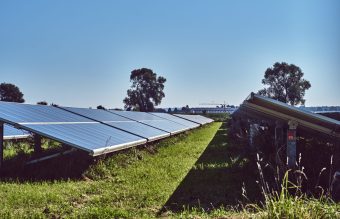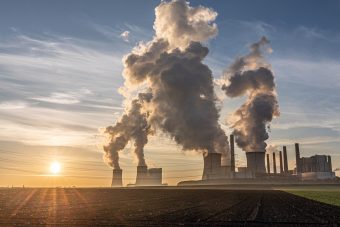
From a conventional Serbian dwelling to a model of modern energy efficiency – the Đukanović family from Serbia have transformed their home by reducing their energy consumption and taming their growing energy costs.
Thanks to an investment in energy-efficient technologies through the European Bank for Reconstruct and Development’s (EBRD) Green Economy Financing Facility (GEFF), they will enjoy a more comfortable and affordable home. At the same time, they will reduce their carbon footprint, which is at its highest in winter.
Miloš Đukanović shares his family home in Belgrade with his wife, children and parents. Last year, the family embarked on a journey to modernise their house and improve its energy efficiency. The 250 m2 house previously relied on a wood burner and, later, a pellet stove for heating. However, the need to enhance the family’s comfort during Serbia’s chilly winters and to find sustainable energy solutions prompted the Đukanovićs to switch to innovative green technologies.
Milos secured a loan totalling 31,000 euros from ProCredit Bank, one of the GEFF partner banks in Serbia, which on-lends funds to residential borrowers for investments in residential energy efficiency and renewable energy solutions.
More:
- FINANCIAL HEADWINDS FOR RENEWABLES INVESTORS: WHAT’S THE WAY FORWARD?
- RENEWABLE SOURCES KEY TO ENERGY SECURITY
- RENEWABLES JOBS NEARLY DOUBLED IN PAST DECADE, SOARED TO 13.7 MILLION IN 2022
The family invested in a heat pump, a photovoltaic system, energy-efficient windows and underfloor heating.
Although such home improvements can reduce energy use and long-term costs significantly, the initial financial outlay can be high. To help homeowners invest in green solutions, GEFF provides technical assistance and grants, supported by its donors.
Upon successful completion of the investment, the Đukanovićs received a grant incentive of 5,800 euros, funded by the European Union (EU).

It was not a quick journey, but definitely a worthwhile one. It took them a year to complete all the work, during which time their home underwent a remarkable transformation.
The expected benefits include a substantial reduction in energy consumption and a corresponding decrease in CO2 emissions of 3.6 tonnes per year. These reductions, coupled with significant savings on energy costs, mean the family will be able to recoup their investment within seven years.
“With the electricity sourced from the photovoltaic system, I anticipate a 50 per cent reduction in our non-heating electricity consumption,” Miloš says. “In addition, the new heating system promises further savings this winter. It means enhanced comfort and, above all, substantial financial relief. The decision to embrace green technologies has not only transformed our home, but also our quality of life.”
Beyond the financial aspects, the shift to green technologies has brought myriad advantages. Not only does the family enjoy a cosier home environment, but their reduced heating expenses have freed up additional funds. Furthermore, the market value of their property has surged, rendering their residence more appealing to prospective buyers or tenants.
The EBRD GEFF in the Western Balkans is co-funded by the EU through the Western Balkans Investment Framework, Austria, Japan and Switzerland through the High-Impact Partnership on Climate Action (HIPCA).
The HIPCA, launched by the EBRD and partner governments at the Glasgow COP26 climate conference in 2021, is supported by Austria, Canada, Finland, South Korea, the Netherlands, Switzerland, Spain, the Taiwan International Cooperation and Development Fund (TaiwanICDF) and the United Kingdom.
Source: EBRD
